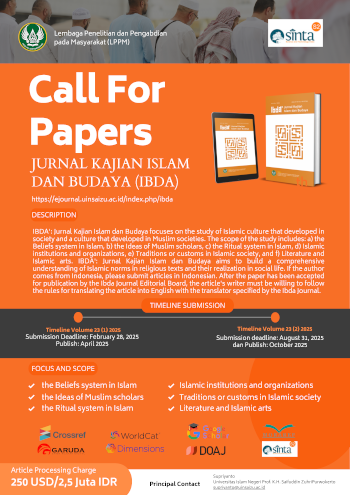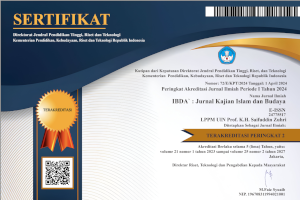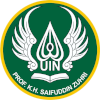The Struggle of Sinden: Female Artists, Family Economy, and Religious Identity in Art
DOI:
https://doi.org/10.24090/ibda.v23i1.13305Keywords:
sinden, cultural heritage, family economy, religious identityAbstract
This study aims to analyze the role, contribution, and convergence of the Sinden (traditional female singer) profession in strengthening the family economy while navigating the challenges of religious identity in Solo, Central Java. This study uses a qualitative approach with an interpretive paradigm and a phenomenological approach. The data collection technique uses in-depth interviews with active Sinden informants with dual roles as housewives and artists. The results of the study indicate that the economic contribution of the head of the family includes the role of an economic safety valve, household financial manager, and teamwork builder in the family. The study also reveals a convergence between religious beliefs and their profession, as Sinden. Despite the ambiguity of this profession in religious communities, primarily due to stage performances that do not strictly adhere to Islamic guidelines, Sinden consistently upholds standards of modesty, religious principles, and their dignity as Muslim women. This study contributes to providing an overview of the dualism of women's roles in the context of Javanese-Islamic culture, which adds insight into the complex interactions between gender, economy, art, and religion in the lives of contemporary traditional societies.Downloads
References
Adefare, T., Adeola, O., Mogaji, E., Nguyen, N. P., & Mogaji, S. A. (2023). Empowering women agriculture entrepreneurs: banks’ role in achieving sustainable development goals. International Journal of Bank Marketing, 42(4).
Adil, M., Mediaty, & Haliah. (2022). Accountability and Transparency in the Public and Private Sector. International Journal Of Humanities Education and Social Sciences (IJHESS), 1(6), 857–862. https://doi.org/10.55227/ijhess.v1i6.167
Amancio, L., & Santos, M. H. (2021). Gender Equality and Modernity In Portugal. An Analysis of the Obstacles To Gender Equality in Highly Qualified Professions. Journal of Social Sciences, 10.
Andes, A. Rehulina. (2024). Pengaruh Islam Dalam Kesenian Dan Kebudayaan Di Pulau Jawa. AL-KAINAH: Journal of Islamic Studies, 3(1), 153–166. https://doi.org/10.69698/jis.v3i1.512
Anoegrajekti, N. (2016). Optimalisasi Seni Pertunjukkan: Konstetasi Negara, Pasar, dan Agama. Orasi Ilmiah Pengukuhan Profesor Ilmu Sastra Indonesia Fakultas Ilmu Budaya Universitas Jember, 2016.
Ardanareswari, I., Honorarium, & Aktris. (2018). Gender: Perempuan Pekerja Seni Dalam Industri Perfilman Indonesia, 1950an-1970an. Lembaran Sejarah, 14(2).
Ariyanti, E. (n.d.). Wawancara oleh penulis. 27 Maret 2024.
Arsini. (2014). Peran Ganda Perempuan Pada Keluarga Masyarakat Agraris: Kasus 10 Istri Buruh Tani di Desa Putat Purwodadi Grobogan. Jurnal Sawwa, 10(1), 4.
Azwar, S. (2004). Metode Penelitian. Pustaka Pelajar Offset.
Bhasin, & Kamla. (1996). Menggugat Patriarki. Yayasan Bentang Budaya dan Kalyanamitra.
Buvinic, M., Knowles, J. C., & Witoela, F. (2022). The unfolding of women’s economic empowerment outcomes: Time path of impacts in an Indonesia trial. World Development, 158.
Couprie, H., Cudeville, E., & Sofer, C. (2019). Efficiency versus gender roles and stereotypes: an experiment in domestic production. Experimental Economics, 23.
Dernberger, B., & Pepin, J. (2020). Gender Flexibility, but not Equality: Young Adults’ Division of Labor Preferences. Sociological Science, 7, 36–56. https://doi.org/10.15195/v7.a2
Dernyanti, A. (2021). Pesan Komunikasi Verbal Sinden dan Penari dalam Pertunjukan Bajidoran. Komversal, 3(2), 158–174. https://doi.org/10.38204/komversal.v3i2.493
Dewi, A. R. (2013). Kedudukan Perempuan Jawa Dalam Novel Hati Sinden Karya Dwi Rahyuningsih Dilihat Dari Perspektif Gender, Sirok Bastra. Jurnal Ilmiah Kebahasaan Dan Kesastraan, 2(1).
Dias, F. (2021). Achieving Sustainable Development Goals Through Women’s Economic Empowerment. 11–20. https://doi.org/10.1007/978-3-319-95687-9_22
Diouf, G. (2019). Millennium Development Goals (MDGs) and Sustainable Development Goals (SDGs) in Social Welfare. International Journal of Science and Society, 1(4), 17–24. https://doi.org/10.54783/ijsoc.v1i4.144
Due, C., Callaghan, P., Reilly, A., Flavel, J., & Ziersch, A. (2021). Employment for women with refugee and asylum seeker backgrounds in Australia: An overview of workforce participation and available support programmes. International Migration, 6.
Firmansyah, C. A., & Sihaloho, E. D. (2021). The Effects of Women Empowerment on Indonesia’s Regional Economic Growth. Jurnal Ekonomi Pembangunan: Kajian Masalah Ekonomi Dan Pembangunan, 22(1), 12–21. https://doi.org/10.23917/jep.v22i1.11298
Friedline, T., Chen, Z., & Morrow, S. P. (2021). Families’ Financial Stress & Well-Being: The Importance of the Economy and Economic Environments. Journal of Family and Economic Issues, 42(s1), 34–51. https://doi.org/10.1007/s10834-020-09694-9
Ghouse, S. M., Durrah, O., & McElwee, G. (2021). Rural women entrepreneurs in Oman: problems and opportunities. International Journal of Entrepreneurial Behavior & Research, 27(7), 1674–1695. https://doi.org/10.1108/IJEBR-03-2021-0209
Hadi, S., Rokhman, N., Kirana, K. C., Andleeb, N., & Purnasari, E. (2023). The Impact of Islamic Work Ethics and Organizational Justice on Organizational Citizenship Behavior: The Mediating Role of Organizational Commitment. Journal of Islamic Economics, 15(2), 373–394. http://journal.uinjkt.ac.id/index.php/iqtishadDOI:https://doi.org/10.15408/aiq.v15i2.33375
Haryanto, S. (2016). Peran Aktif Wanita Dalam Peningkatan Pendapatan Rumah Tangga Miskin : Studi Kasus Pada Wanita Pemecah Batu Di Pucanganak Kecamatan Tugu Trenggalek’. Jurnal Ekonomi Pembangunan, 216.
Horton, P. B., & Hunt, C. L. (2006). Sosiologi Jilid I. Erlangga.
Ichsan Kabullah, M., & Fajri, M. N. (2021). Neo-Ibuism in Indonesian Politics: Election Campaigns of Wives of Regional Heads in West Sumatra in 2019. Journal of Current Southeast Asian Affairs, 40(1), 136–155. https://doi.org/10.1177/1868103421989069
Indriyani, R. (n.d.). Wawancara oleh penulis. 27 Maret 2024.
Januar, A., & Pranata, A. (2024). Islam Jawa : Islam Versus Budaya. 2(2), 80–89.
Junaidi, H. (2023). The Perishment of the Economics Sector in Women’s Domestication During the COVID-19 Pandemic in Indonesia. International Journal of Economics and Business Research, 26(4). https://doi.org/10.1504/IJEBR.2023.10058435
Keshavarz, M., & Moqadas, R. S. (2021). Assessing rural households’ resilience and adaptation strategies to climate variability and change. Journal of Arid Environments, 184.
Kesselmen & Women. (1999). A Multicultural Anthology, Second Edition. Mayfield Publishing Company.
Khan, R. U., Salamzadeh, Y., Shah, S. Z. A., & Hussain, M. (2021). Factors affecting women entrepreneurs’ success: a study of small- and medium-sized enterprises in emerging market of Pakistan. Journal of Innovation and Entrepreneurship, 10(1). https://doi.org/10.1186/s13731-021-00145-9
Khasanah, M. (n.d.). Wawancara oleh penulis. 26 Maret 2024.
Klugman, J., & Tyson, L. (2016). Leave No One Behind: A Call to Action for Gender Equality and Women’s Economic Empowerment. United Nations Secretary-General High-Level Panel on Women's Economic Empowerment, 1.
Kurniawan, D. F., & Pradita, A. I. (2014). Setting, Tata Rias, Dan Kostum Drama Komedi Televisi Opera Van Java Sebagai Strategi Program Melalui Penghadiran Kedekatan Dengan Penonton (Studi Kasus Episode “Misteri Pesona Sinden”). Capture: Jurnal Seni Media Rekam, 6(1).
Kusnadi, Sulistiyowati, H., Sumarjono, & Prasodjo, A. (2006). Perempuan Pesisir. LKIS Pelangi Aksara.
Kusnadi. (2015). Pemberdayaan perempuan Pesisir: Pengembangan Sosial-Ekonomi Masyarakat Pesisir Melalui Budidaya Rumput Laut. Graha Ilmu.
Liasari, D., & Badrun, B. (2022). Integrasi Islam dan Kebudayaan Jawa dalam Kesenian Wayang. Local History & Heritage, 2(1), 31–37. https://doi.org/10.57251/lhh.v2i1.325
Malangrti, Y. P. U. M. (2005). Pekerja Wanita Pada Industri Rumah Tangga Sandang Dan Kontribusinya Terhadap Pendapatan Rumah Tangga Di Kecamatan Sukun Malang. 17(2).
Malik, M. S., & Maslahah, M. (2021). The Interrelationship of Javanese and Islamic Values on Educational Aspects and Economic Aspects. Journal of Islamic Studies and Humanities, 6(2), 120–129. https://doi.org/10.21580/jish.v6i2.8717
Mandel, H., Lazarus, A., & Shaby, M. (2020). Economic Exchange or Gender Identities? Housework Division and Wives’ Economic Dependency in Different Contexts. European Sociological Review, 36(6).
Masyhuri, & Zainuddin, M. (2011). Metode Penelitian Pendekatan Praktis dan Aplikatif. Refia Aditama.
Mulyanto, D. (2006). Usaha Kecil dan Persoalan Di Indonesia. Yayasan AKATIGA.
Munawir & Halimah. (2011). The Sinden. PT. Gramedia Pustaka Utama.
Mutmainnah, Andi Muh Taqiyuddin, Samsidar Jamaluddin, & Nazaruddin. (2023). Konsep Profesi Perspektif Islam Concept of Profession in Islamic Perspective. Ethics and Law Journal: Business and Notary (ELJBN), 1(3), 2988–1293. http://journals.ldpb.org/index.php/eljbn
Nirmalasari, S. A., & Putri, N. (2022). Peran Perempuan Dalam Meningkatkan Ekonomi Rumah Tangga Perspektif Maqashid Syariah Jasser Auda (Studi Kasus Di Kecamatan Tengaran Kabupaten Semarang). Jurnal Magister Ekonomi Syariah, 1(1), 43–52. https://doi.org/10.14421/jmes.2022.011-04
Noor, J. (2012). Metodologi Penelitian. Prenadamedia Group.
Nurulmi. (2017). Peran Perempuan Dalam Peningkatan Kesejahteraan Keluarga Petani Di Desa Padangloang Kecamatan Patampanua Kabupaten Pinrang. In Skripsi.
Others, J. W. and.. (2015). The Power of Parity: How Advancing Women's Equality Can Add $12 Trillion to Global Growth. McKinsey Global Institute, 1.
Parker, S., Brown, R. K., J. Child, & Smith, M. A. (1992). Sosiologi Industri. PT.Rineka Cipta.
Pasaribu, D. M., Suhariadi, F., & Handoyo, S. (2023). Analysis of Islamic Spirituality in the Workplace and Islamic Work Ethics on OCB (Organizational Citizenship Behavior) in an Islamic Perspective. Psikoborneo: Jurnal Ilmiah Psikologi, 11(3), 329. https://doi.org/10.30872/psikoborneo.v11i3.11312
Puspitasari, D. C. (2012). Modal Sosial Perempuan dalam Peran Penguatan Ekonomi Keluarga. Jurnal Pemikiran Sosiologi, 1(2), 72.
Putri Anjani, S. A., & Supriaza, H. (2022). Stereotip Sinden Sunda: Keadilan Perempuan dalam Berekspresi Seni. Jurnal Kajian Seni, 9(1), 85. https://doi.org/10.22146/jksks.72221
Quail Mass, M. (2000). Communication Theory. Sage Publications.
Ramadani, N. (2016). Implikasi Peran Ganda Perempuan Dalam Kehidupan Keluarga dan Lingkungan Masyarakat. Jurnal Sosietas, 6(2), 3.
Riyanto, C. S., Fadila, N. I., Avisya, I. M. C., Irianti, B. C., & Radianto, D. O. (2023). Kesetaraan Gender. Humantech: Jurnal Ilmiah Multidisiplin Indonesia, 2(8), 1767–1773.
Rostiyati, A. (2018). Peran Ganda Perempuan Nelayan di Desa Muara Gading Mas Lampung Timur. Patanjala, 10(2).
Rosyadi. (2015). Fenomena Penggunaan Magi Pada Kalangan Sinden Di Kabupaten Subang – Jawa Barat (Studi Tentang Sistem Religi)”. Jurnal Patanjala, 7(1).
Rubini. (n.d.). Wawancara oleh penulis. 27 Maret 2024.
Saepudin, A. (2024). Slapstick in the Wayang Kulit Arena : Gender Domination Practices Lead to Symbolic Violence. 17(1), 45–72.
Sear, R. (2021). The male breadwinner nuclear family is not the "traditional" human family, and the promotion of this myth may have adverse health consequences. Philosophical Transactions of the Royal Society B: Biological Sciences, 376(1827). https://doi.org/10.1098/rstb.2020.0020
Setiawan, N. (2020). Eksistensi Perempuan dalam Tari Masa Mangkunegera IX Bercermin pada Tari Bedhaya Anglir Mendhung dan Bedhaya Suryasumirat. Jurnal Wanita Dan Keluarga, 1(1), 7–15. https://doi.org/10.22146/jwk.76
Singh, P., & Pattanaik, F. (2020). Unfolding unpaid domestic work in India: women's constraints, choices, and careers. Palgrave Communications, 6(1), 1–13. https://doi.org/10.1057/s41599-020-0488-2
Soerjono. (1997). Sosiologi: Suatu Pengantar. Rajagrafindo Persada.
Stoner, J. A. F. (1996). Manajement Jilid I & II. Prenhallindo.
Su, M. M., Wal, G., Ma, Lj., Notarianni, M., & Wang, S. (2023). Empowerment of women through cultural tourism: perspectives of Hui minority embroiderers in Ningxia, China. Theoretical Advancement in Social Impacts Assessment of Tourism Research, 22.
Sugiyono. (2021). Metode Penelitian Kuantitatif, Kualitatif, dan R&D. Alfabeta.
Suhardono, E. (1994). Teori Peran: Konsep, Derivasi dan Implikasinya. Gramedia Pustaka Utama.
Sukmawati, D., & Maryanti, R. (2021). Development of Education and Economic Circulation in Supporting Local Potential as Community Empowerment Efforts Amid the Covid-19 Pandemic. Indonesian Journal of Multidisciplinary Research, 1(2), 235–250. https://doi.org/10.17509/ijomr.v1i2.37598
Sulityorini, Y. (n.d.). Wawancara oleh penulis. 27 Maret 2024.
Suminah. (2020). Empowering Poor-Household Women on Productive Economy Businesses in Indonesia. The Journal of Asian Finance, Economics and Business, 7(9), 769–779. https://doi.org/10.13106/jafeb.2020.vol7.no9.769
Supanggah (1988). Dibuang Sayang. Sekolah Tinggi Seni Indonesia Surakarta.
TangView, C. S. (2022). Innovative Technology and Operations for Alleviating Poverty through Women’s Economic Empowerment. Production and Operations Management V, 31(1).
Tumbage, S. M. E., Tasik, F. C. M., & Tumengkol, S. M. (2017). Peran Ganda Ibu Rumah Tangga DalamMeningkatkan Kesejahteraan Keluarga di Desa Allude Kecamatan Kolongan Kabupaten Talaud. Jurnal Acta Diurna, 6(2).
Vitta, R., & Oktaviani. (n.d.). Wawancara oleh penulis. 27 Maret 2024.
Walton, S. P. (1996). Heavenly Nymphs and Earthy Delights: Javanese Female Singers, Their Music and Their Lives. University of Michigan.
Washfi, M. (2005). Mencapai Keluarga Barokah. Mitra Pustaka.
Whit, K., Watkins, K., & Byram, J. L. (2020). How Financial Socialization Messages Relate to Financial Management, Optimism, and Stress: Variations by Race. Journal Of Family And Economics Issues, 24, 232–250.
Wulandari, N. (n.d.). Wawancara oleh penulis. 27 Maret 2024.
Yusuf, M. (2017). Metode Penelitian Kuantitatif, Kualitatif, dan Penelitian Gabungan. Prenadamedia Group.
Downloads
Published
How to Cite
Issue
Section
License
Copyright (c) 2025 Bayu Tri Cahya, Waluyo, Ratih Paramitasari, Sekar Rani Salsabila

This work is licensed under a Creative Commons Attribution-ShareAlike 4.0 International License.
Authors who publish with this journal agree to the following terms:
- Authors retain copyright and grant the journal right of first publication with the work simultaneously licensed under a Creative Commons Attribution-ShareAlike License a that allows others to share the work with an acknowledgement of the work's authorship and initial publication in this journal.
- Authors are able to enter into separate, additional contractual arrangements for the non-exclusive distribution of the journal's published version of the work (e.g., post it to an institutional repository or publish it in a book), with an acknowledgment of its initial publication in this journal.
- Authors are permitted and encouraged to post their work online (e.g., in institutional repositories or on their website) before and during the submission process, as it can lead to productive exchanges, as well as earlier and greater citation of published work (See The Effect of Open Access).
















